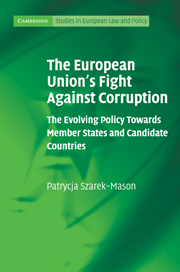 The European Union's Fight Against Corruption
The European Union's Fight Against Corruption Book contents
- Frontmatter
- Contents
- Table of cases
- Acronyms and abbreviations
- List of tables and figures
- Introduction
- 1 Corruption: concept, importance and international response
- 2 The scope of EU legal powers and development of the policy in the area of anti-corruption
- 3 The EU strategy against corruption within the Member States
- 4 Conditionality in the EU accession process
- 5 The EU's evaluation of corruption in the Central and Eastern European candidate countries
- 6 The EU anti-corruption strategy towards the Central and Eastern European candidate countries: achievement or missed opportunity?
- 7 The impact of 2004 enlargement on the EU anti-corruption policy
- 8 Conclusion
- List of interviews and consultations
- Appendix 1
- Appendix 2
- Bibliography
- Index
- CAMBRIDGE STUDIES IN EUROPEAN LAW AND POLICY
6 - The EU anti-corruption strategy towards the Central and Eastern European candidate countries: achievement or missed opportunity?
Published online by Cambridge University Press: 03 May 2010
- Frontmatter
- Contents
- Table of cases
- Acronyms and abbreviations
- List of tables and figures
- Introduction
- 1 Corruption: concept, importance and international response
- 2 The scope of EU legal powers and development of the policy in the area of anti-corruption
- 3 The EU strategy against corruption within the Member States
- 4 Conditionality in the EU accession process
- 5 The EU's evaluation of corruption in the Central and Eastern European candidate countries
- 6 The EU anti-corruption strategy towards the Central and Eastern European candidate countries: achievement or missed opportunity?
- 7 The impact of 2004 enlargement on the EU anti-corruption policy
- 8 Conclusion
- List of interviews and consultations
- Appendix 1
- Appendix 2
- Bibliography
- Index
- CAMBRIDGE STUDIES IN EUROPEAN LAW AND POLICY
Summary
As discussed in Chapter 3, the EU has not developed a coherent policy to assist Member States in the fight against domestic corruption. However, the enlargement process and the ‘Copenhagen mandate’ allowed the EU to impose much broader anti-corruption demands on the candidate countries. The high levels of corruption within the CEE countries and the dangers that corruption carried for the success of democratic transformation forced the EU to develop a new strategy against it. Moreover, the fight against corruption was crucial for the success of many reforms required by the EU membership. The outcome of public administration and judiciary reforms depended on how well the candidate countries addressed the problem of corruption.
It is also important to emphasise that during the pre-accession process, the Council explicitly recognised that corruption impaired the implementation of the acquis in many areas and thus combating corruption was ‘an important part of the acquis in itself’. Moreover, the Council noted that corruption has a particularly harmful effect on the rule of law in the candidate countries, citing five reasons:
generates a parallel system that operates independently of established public order;
is a breeding ground for illegal activities;
restricts access to public services for those who cannot or will not be party to it;
introduces uncertainty into trade;
distorts economic system and deprives the state of revenue.
In addition, there was a more immediate danger that corruption could undermine the proper administration of EU aid programmes.
- Type
- Chapter
- Information
- The European Union's Fight Against CorruptionThe Evolving Policy Towards Member States and Candidate Countries, pp. 182 - 217Publisher: Cambridge University PressPrint publication year: 2010
- 1
- Cited by


